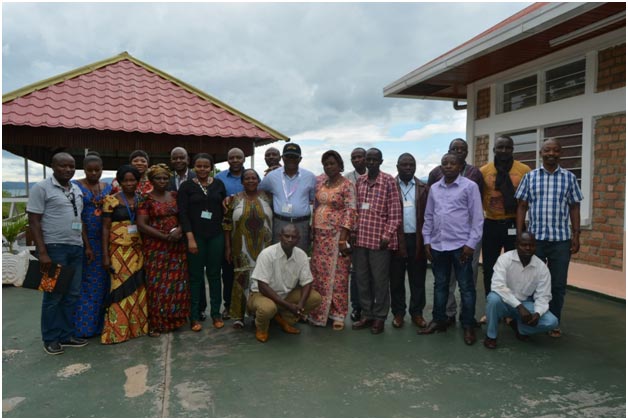
CCPC operators in South Kivu, DR Congo, meet to chart action for steady progress
For two days, 9—10 May, managers of eight community cassava processing centers (CCPCs) in Kavumu, Katana, Mulamba, Bunyakiri 1, Bunyakiri 2, Kamanyola, and Luvungi as well as technicians in charge of production met at IITA Kalambo to take stock, exchange experiences, share knowledge, and articulate strategies on the way forward.
Other participants included IITA Kalambo Youth Agripreneurs (IKYA) and some private sector processors (PIDER-SK and Ste. Kalebwa).
In his opening remarks, Chris Okafor, the Officer in Charge, IITA Kalambo Station, drew the attention of participants to the growing importance and popularity of cassava processing in South Kivu given the increasing demand for high quality cassava flour in the urban areas. The CCPCs presented their performance reports and experiences in turn. The key points included quantity of high quality cassava flour (HQCF) produced, fresh root procurement using collection centers, linkage to IKYA, solar drying experience, constraints such as transport, market access, multiple taxes, community farms, and efforts at distributing planting materials.
IKYA also shared their experience in processing. They indicated that demand for HQCF was high and encouraged the CCPCs to increase their production. They offered suggestions on how the CCPCs can improve their access to the market. The workshop was facilitated by a team made up of Kasereka Bishikwabo, IITA Value Chain Advisor; Byamungu Kigangu Moustapha, Technical Assistant, and Nsindabagoma Francine, SARD-SC Program Support Officer.
As part of the workshop, the CCPC members visited the Katana CCPC located 45 km from Kalambo station where they appreciated the processing activities of the CCPC and the solar driers. They also visited the banana garden at the Kalambo station since some of them benefited from improved banana seedlings distributed by the Station. They appreciated the healthy nature of the plants and felt encouraged to improve management of their banana plots.
As a way forward, the workshop proposed action points to be applied by the CCPCs. The key ones included establishment of multiplication farms with improved varieties; increasing production levels per month; strengthening linkage with IKYA; organization of at least three collection centers per CCPC; and dissemination of other cassava recipes in their respective constituencies to promote consumption of HQCF by the local population.
At the end of the workshop, a representative of the World Bank project in South Kivu who was on an official visit to the Station interacted with participants. He commended IITA and the CCPC leaders while pointing out that the initiative was in line with Government and the World Bank’s efforts aimed at developing cassava value chain and the rural economy in South Kivu.
